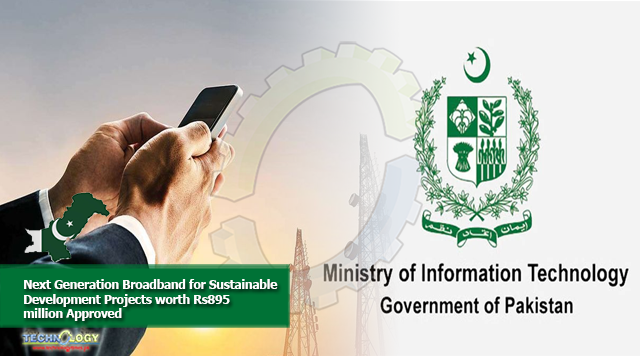Ministry of IT and Telecom Thursday approved Rs895 million contracts for Next Generation Broadband for Sustainable Development Projects.

The approval was given in the 73rd Board of Directors meeting of Universal Service Fund chaired Federal Secretary for Ministry of IT and Telecom Shoaib Ahmad Siddiqui.
Other board members comprising Maj-Gen (R) Amir Azeem Bajwa, Chairman PTA Sabahat Ali Shah, CEO-NITB; Irfan Wahab, CEO-Telenor Pakistan; Rashid Khan, CEO-PTCL and Nominee of Fixed Line Operators; Kaukab Iqbal, Chairman-Consumer Association of Pakistan and Nominee of Consumer Group and management of USF Co also attended the meeting.
The BOD approved award of contracts to PMCL (Jazz), CMPAK (Zong) and PMTL (Ufone) for Next Generation Broadband for Sustainable Development Projects worth approximately Rs895 million.
Jazz was awarded the contract of Ghotki, Sukkur and Khairpur Districts while Zong awarded the contract of Jaffarabad, Sohbatpur and Nasirabad Districts. Simultaneously, Ufone is also being awarded the contract of Ziarat and Kalat Districts.
The Hi-speed mobile broadband services in Ghotki, Sukkur and Khairpur Districts will benefit an unserved population of around two million thereby covering 549 unserved districts and an approximate unserved area of 23,252sq km.
Similarly, an unserved population of approximately 0.4 million will gain advantage from Hi-speed Mobile Broadband services in Jaffarabad, Sohbatpur and Nasirabad
Districts thereby covering 227 unserved mauzas and approximately 3,431sq km of unserved area. Likewise, the Hi-speed Mobile Broadband services in Ziarat and Kalat Districts will benefit an unserved population of 17,406 thereby covering 15 unserved mauzas and an approximate unserved area of 64sq km.
During the meeting, Secretary IT was apprised about the progress in USF projects. He stressed on the critical need of internet connectivity, especially now, as working and educating from home has become the norm.
Moreover, he informed that mobile broadband services would socially and economically transform the lives of millions residing in Balochistan and Sindh. In addition, he added that these projects had the potential to impact important aspects of society such as healthcare, education and business opportunities.
Originally published at The news international